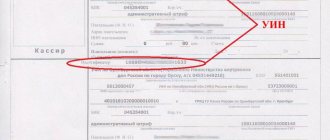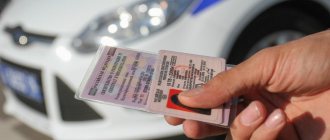What is the difference between termination of registration and deregistration?
First, a little history:
Before July 10, 2021, the concepts of termination of registration and deregistration were different.
From July 10, 2021 to December 31, 2021, the concepts meant the same thing.
From January 1, 2021, each of the concepts again received its own meaning.
Let's consider Article 10 of the Federal Law “On State Registration of Vehicles”:
4. Registration actions include: ... 3) termination of state registration of a vehicle - inclusion in the appropriate entry of the state register of vehicles of information about the temporary termination of the vehicle’s admission to participation in road traffic;
4) renewal of state registration of a vehicle - cancellation of a previously made decision to terminate state registration of a vehicle;
5) removal of a vehicle from state registration - transfer of a vehicle record to the archive of the state register of vehicles;
6) restoration of state registration of a vehicle - cancellation of the transfer of a vehicle record to the archive of the state register of vehicles if actions to remove a vehicle from state registration are recognized as illegal or unfounded;
From this point we can draw the following conclusions:
- termination of registration is a temporary procedure;
- deregistration is a final procedure.
In fact, if you look at the situation through the eyes of a simple driver, you won’t notice much of a difference between these concepts. In both cases, the car cannot be used.
The law also contains opposite concepts:
- resumption of accounting is the reverse operation for stopping accounting;
- accounting restoration is the reverse operation for deregistration.
All of the procedures listed below are discussed in more detail.
What are the risks of buying a car?
So, as we found out, recording the last operation in this form in itself does not mean anything criminal. But based on the registration dates, additional questions may arise for the seller of this car.
If a lot of time has passed from the date of ownership of the vehicle to the registration of the deregistered car, then you need to find out why this registration was stopped and why the car was not registered with the traffic police for so long.
For example, in the State Traffic Inspectorate database the previous ownership period is from January 1, 2010 to January 1, 2014, and then it says “Individual, last operation, registration of deregistered persons,” but with the date of this registration only in 2015. What does it mean? And the fact that in fact the car was not registered for more than a year. It was forbidden to ride it.
This begs the question - why wasn’t the car registered? There may be several reasons for this:
- the car was in a serious accident, and the owner (individual) did not have the money to repair it; at the same time, it was either sold and deregistered under a sales contract, or the current owner himself ceased registration in order not to pay transport tax,
- the car broke down, and the repair was also expensive (the engine, gearbox or other expensive components died),
- the car was also sold, but the new buyer, for one reason or another, could not re-register it in his name; in this case, you should be afraid of such reasons as: a replaced engine with another model, an unreadable or broken VIN number, the presence of a search for the car (if it is stolen or lost).
Unfortunately, it is not possible to reliably find out what such a large difference in dates means - only the owner of the car knows this. But if there was a purchase and sale transaction, you can contact the previous seller - perhaps he will tell you something new.
In what cases is it possible to terminate registration?
Let's consider Article 18 of the Federal Law “On State Registration of Vehicles”:
1. State registration of a vehicle is terminated:
1) at the request of the owner of the vehicle;
2) at the request of the previous owner of the vehicle if the new owner of the vehicle has not applied to the registration department within ten days from the date of its acquisition to make appropriate changes to the registration data of the vehicle;
3) if there is information about the death of the owner of the vehicle;
4) if there is information about the liquidation of a legal entity that is the owner of a vehicle, or about the termination of activities by an individual who is the owner of a vehicle as an individual entrepreneur;
5) if there is information about the termination of guardianship (trusteeship) over the owner of the vehicle, and in relation to a vehicle owned by one of the parents or adoptive parent of a person under the age of sixteen who is the owner of the vehicle - when the owner of the vehicle reaches the age of sixteen years old;
6) if the vehicle is registered with the state on the basis of documents subsequently recognized as counterfeit (forged) or invalid, as well as when the grounds specified in Part 1 of Article 20 of this Federal Law are identified - in the manner and on the conditions determined by the Government of the Russian Federation Federations;
7) due to the expiration of the state registration of the vehicle.
At the request of the car owner
If the car owner wants to stop registering the car, he can do so. In 2021, there is no need to look for special reasons and justifications for this. For example, registration can be terminated in the following cases:
- if the car is not in use and the person does not want to pay transport tax for it;
- if the car is lost;
- if the car is stolen;
- if a person wants to keep the license plates of the car, and sell the car itself without license plates.
10 days after selling the car
If the car is sold, and the new owner has not registered it, then the previous owner can, on his own initiative, terminate the registration.
Termination of registration after sale
On the initiative of the traffic police
Without the participation of the car owner, registration may be terminated in the following cases:
- if information has been received about the death of the owner of the car (Article 18, Part 1, Clause 3);
- if information has been received about the liquidation of a legal entity or individual entrepreneur (Article 18, Part 1, Clause 4);
- upon termination of guardianship or trusteeship of the owner of the car (Article 18, Part 1, Clause 5);
- when the owner of the car reaches the age of 16 years (Article 18, Part 1, Clause 5);
- if the documents on the basis of which the car is registered are found to be counterfeit or invalid (Article 18, Part 1, Clause 6);
- in the absence of an engine number or body number (Article 20, Part 1, Clause 1);
- when replacing a car engine without making changes to the registration documents (Article 20, Part 1, Clause 2);
- when making changes to the design without approval from the traffic police (Article 20, part 1, clause 4);
- if the car or its engine is wanted (Article 20, Part 1, Clause 5);
- if the temporary registration period has expired (Article 18, Part 1, Clause 7).
Application form
An application to terminate registration, as well as to perform certain other actions, is written on a special form.
In 2021, an updated form is used, which can be obtained only at traffic police departments, but can also be downloaded online. You can submit documents either during a personal visit to the traffic police or using the State Services portal. When filling out an application, you may encounter similar concepts: “deregistration” and “termination of registration.” But the similarities are only superficial. In fact, there are significant differences here. Thus, termination of registration means temporary deletion of all information about the vehicle. But in the future they must be restored. If registration is terminated, the car is still registered with the traffic police. She is registered, but there is no information about her yet. There are many reasons why deregistration may be necessary.
When do you need to write a paper to terminate the registration of a vehicle?
The most common situations in which it is necessary to deregister a car include:
- recycling;
- sale;
- hijacking;
- export outside the state.
Most often this procedure is performed after the sale. This is explained by the fact that the law does not oblige the seller to deregister the vehicle. But after the sale, the new owner must re-register the car in his own name. He must appear at the traffic police department within ten days after acquiring movable property. If this period is overdue for some reason, the new owner does not have the right to become a road user.
You can often encounter a situation where the new owner is in no hurry to re-register the car. In fact, he breaks the law and continues to drive the purchased car for more than ten days after the transaction. In this case, if stopped by an inspector, the driver will pay a fine of 800 rubles. If the violation is repeated, the fine will increase, and the driver may be deprived of his license. But at the same time, the seller is considered the official owner of the car. Naturally, all receipts for payment of fines will come to him. By law, it is the official owner who is obliged to pay for them. Thus, we can conclude that both parties are interested in terminating registration.
( Video : “Cessation of registration of a vehicle with the traffic police”)
What documents are needed to terminate registration?
The list of documents required to terminate registration depends on the reason for which the vehicle registration is terminated.
According to the current owner
Let's consider paragraph 56 of the Vehicle Registration Rules, paragraphs 132 and 27 of the Traffic Police Administrative Regulations for vehicle registration:
56. Termination of state registration of a vehicle at the request of the vehicle owner is carried out by the registration department on the basis of an application for registration action submitted by the owner of the vehicle or his representative.
132. Termination of state registration of a vehicle in accordance with clause 56 of the Rules is carried out by the registration department on the basis of documents established by sub-clauses 27.1 - 27.3 of clause 27 of the Administrative Regulations. In this case, the administrative procedures provided for in subparagraphs 61.1, 61.2, 61.4 and 61.7 of paragraph 61 of the Administrative Regulations are carried out.
27. To receive public services, applicants submit documents provided for in Article 15 of the Federal Law:
27.1. Application from the vehicle owner to complete registration actions.
27.2. A document certifying the identity of an individual who is the owner of a vehicle, and in the case of an application from a representative of the owner of the vehicle - also a document certifying the identity of the representative of the owner of the vehicle and a document confirming his authority.
27.3. Documents identifying the vehicle (vehicle chassis):
That is, upon termination of registration at the request of the current owner, the traffic police will require:
- statement (discussed below);
- passport of the car owner;
- PTS and vehicle registration certificate.
According to the previous owner
Let's consider paragraph 57 of the Vehicle Registration Rules and paragraph 133 of the Administrative Regulations of the State Traffic Safety Inspectorate for vehicle registration:
57. Termination of state registration of a vehicle in the event of its alienation is carried out by the registration department on the basis of an application from the previous owner of the vehicle and the presentation by him of documents on the conclusion of a transaction aimed at alienating the vehicle, provided that there is no confirmation of the registration of the vehicle with the new owner.
133. Termination of state registration of a vehicle in accordance with paragraph 57 of the Rules is carried out by the registration department on the basis of the documents established by subparagraphs 27.1 - 27.3 of paragraph 27 of the Administrative Regulations, an application from its previous owner and the presentation by him of documents on the conclusion of a transaction aimed at alienating the vehicle, in the absence of confirmation registration of the vehicle for the new owner. In this case, the administrative procedures provided for in subparagraphs 61.1, 61.2, 61.4 and 61.7 of paragraph 61 of the Administrative Regulations are carried out.
In this case, the traffic police requires the following documents:
- statement (discussed below);
- passport of the car owner;
- contract for the sale of a car.
Note. The regulations on vehicle registration also talk about what needs to be provided to the traffic police with a PTS and a registration certificate. However, these documents are transferred to the new owner along with the car, so you won’t be able to take them with you in any case.
On the initiative of the traffic police
In this case, no documents are provided to the traffic police; department employees make the decision to terminate registration on their own.
What is cancellation?
Russian legislation has established that every vehicle must undergo special registration.
Quite often, the need for this arises as a consequence of certain legal procedures that may entail the re-registration of property rights, for example, this may be a purchase and sale transaction.
Confirmation of the fact that the car was registered at the time is a registration certificate or technical passport. These documents enable the owner of the car to move freely across the expanses of the homeland, as well as beyond its borders.
A vehicle passport is a legal document that contains basic technical information. Based on it, traffic police officers identify the vehicle.
Along with the popularity of registration, we can note situations when registration is completely canceled . This process implies the fact that the previous registration procedure is invalid and canceled for various reasons.
Most often, the need for this arises after identification of violations with documents. In this case, the registration of the vehicle is canceled with an explanation from the Supreme Arbitration Court.
If traffic police officers suspect fraud with a car and it is later confirmed, the vehicle is driven to a impound lot, and its owner will need to undergo a certain number of checks.
Very often, illegal registration systems are used in the process of car customs clearance. This automatically results in the need to cancel.
Many of these considerations lead to the decision to purchase their cars from car dealerships. This is an ideal guarantee to avoid a variety of illegal schemes.
What happens when registration is terminated?
In general, termination of registration looks like this:
- The car owner contacts the traffic police with the above documents and car numbers.
- The traffic police takes and destroys the vehicle title and registration certificate (clause 61 of the registration rules).
- If the car owner did not indicate in the application that he wants to keep the plates, then the plates are also confiscated (clause 61 of the registration rules).
- A mark is placed in the database indicating that the registration of the car has been terminated (clause 55 of the registration rules).
There is no need to present the car itself to the traffic police.
Attention! If you subsequently decide to renew your registration (discussed below), you will need at least one registration document.
That is, first the rules say that the registration document is destroyed when registration is terminated, and then that the same registration document is needed to restore registration. This is a flaw in the regulatory document that can cause problems in practice.
In this regard, it makes sense to “lose” the PTS before contacting the traffic police and submit only the registration certificate for destruction. And the PTS will be used in the future to identify the car.
Restoring a canceled registration
To resolve the issue of how to restore the registration of a vehicle after cancellation, it is worth relying on paragraph 51 of the rules for the registration being carried out.
It states that if the reasons that became the basis for the complete termination of the registration process are eliminated, the restoration of registration is carried out strictly at the place of application of the driver.
This is an ideal solution to the question of what to do when deregistering a car.
After carrying out the necessary manipulations, the owner of the car is issued new registration documents - new state signs for the car and a passport for it, if the situation requires it.
To restore registration, you will need to perform the following manipulations:
- Elimination of illegal changes to the design of the car, due to which registration was terminated.
- Contact the nearby traffic police department for a new registration process.
When carrying out this process, in simple processes, the license plate number of the car and its passport can be saved.
As for payment, you will need to pay 500 rubles for issuing a certificate, and 350 rubles for making changes to the passport.
There is another method for restoring registration . Provided that the vehicle meets the basic established traffic safety requirements, registration is restored on the basis of certain court decisions.
How to renew a terminated registration?
Let's consider paragraphs 62 and 67 of the Vehicle Registration Rules:
62. Renewal of the state registration of a vehicle is carried out by making an entry in the state register of vehicles by the registration department about the renewal of the vehicle’s admission to participation in road traffic.
67. Renewal of state registration of a vehicle is carried out by the registration department at the place of application of the vehicle owner with the issuance of a new registration document and vehicle passport (in the absence of an electronic passport).
Renewal of state registration of a vehicle, except for the cases provided for in paragraph 68 of these Rules, is carried out with the assignment of a state registration number.
When renewing registration, the traffic police enters information into the database, and also issues the driver a new registration certificate, vehicle passport and assigns registration plates (numbers). The number does not have to be new; you can also assign a number from storage.
But for issuing a registration certificate and PTS you will have to pay state fees: 800 and 500 rubles .
Note. If the registration was terminated erroneously or illegally, it is renewed without paying fees, without providing documents and without inspecting the vehicle. However, to do this, you need to contact exactly the unit whose employees stopped registering (clause 68 of the registration rules).
In other cases, the choice of registration renewal option depends on the reason for which the registration was terminated. In addition, if a car whose registration has been terminated is sold or donated to another owner, then the procedure for renewing registration will also have some features.
If registration is terminated at the request of the owner
Let's consider clause 63 of the Registration Rules:
63. Resumption of state registration of a vehicle terminated in accordance with paragraph 56 of these Rules in the absence of a transfer of ownership of it is carried out by the owner of the vehicle, information about which is contained in the state register of vehicles, when the owner of the vehicle or his representative submits an application for registration actions, a document identifying the vehicle, a document confirming payment of the state duty, a document certifying the identity of the person applying, and in the case of an application not on one’s own behalf, also a document confirming his authority.
If the car remained with the previous owner (was not sold), then the following documents will be required to renew registration:
- statement (discussed below);
- receipts for payment of state fees;
- car owner's passport;
- registration certificate or PTS.
Once again, note the ambiguity of the situation. When registration is terminated, the rules require you to hand over the STS and PTS to the traffic police, and when renewed, they require you to provide these documents. In this regard, before terminating registration, it makes sense to “lose” the title.
If you stopped registering earlier and submitted all documents to the traffic police, then take copies of them with you. If you haven’t even saved copies, then simply contact the traffic police without identifying documents.
Since the owner of the car has not changed, there is no need to present the car to the traffic police for inspection .
Resumption of state registration of a vehicle terminated in accordance with paragraph 56 of these Rules, in the event of a transfer of ownership of it or a change in the owner of the vehicle, is carried out by the new owner of the vehicle. In addition to the documents specified in paragraph one of this paragraph, documents confirming ownership of the vehicle and an insurance policy for compulsory civil liability insurance of vehicle owners are presented, and the vehicle is also inspected.
If the car, the registration of which was terminated upon application, is sold or donated to another owner , then the list of documents for return will be slightly different:
- statement (discussed below);
- receipts for payment of state fees;
- car owner's passport;
- registration certificate or PTS;
- purchase and sale agreement or gift agreement;
- OSAGO insurance.
In addition, when changing ownership, the vehicle must be inspected by the traffic police.
If registration is terminated by the previous owner after sale
Clause 64 of the registration rules:
64. Resumption of state registration of a vehicle terminated in accordance with paragraphs 57 and 58 of these Rules is carried out by the new owner of the vehicle in the manner prescribed by paragraph two of paragraph 63 of these Rules.
Required documents:
- statement (discussed below);
- receipts for payment of state fees;
- car owner's passport;
- registration certificate or PTS;
- purchase and sale agreement or gift agreement;
- OSAGO insurance.
Vehicle inspection required.
If registration is terminated after the death of the previous owner
In this case, it will be possible to restore registration only after the inheritance procedure is completed:
Registration of a car by inheritance
Required documents:
- statement (discussed below);
- receipts for payment of state fees;
- car owner's passport;
- registration certificate or PTS;
- certificate of inheritance;
- OSAGO insurance.
Vehicle inspection required.
Clause 67 of the Registration Rules:
When resuming the state registration of a vehicle, the registration of which was terminated due to the death of the owner of the vehicle in accordance with paragraph 58 of these Rules, in the presence of the will of the new owner, state registration plates recognized as invalid in accordance with paragraph 61 of these Rules and entered by the registration department into the relevant search records records of lost special products of the State Traffic Inspectorate are excluded from the list of wanted ones and are retained for the vehicle.
When entering into an inheritance, the heir has the right to keep the car's license plates . However, this can only be done if the region code on the number corresponds to the place of registration of the heir.
If registration is terminated upon liquidation of a legal entity or individual entrepreneur
This section discusses cases when registration is terminated:
- upon liquidation of a legal entity;
- upon termination of the activities of the individual entrepreneur.
To restore in this case you will need:
- statement (discussed below);
- receipts for payment of state fees;
- car owner's passport;
- registration certificate or PTS;
- car purchase and sale agreement or other document confirming the change of owner;
- OSAGO insurance.
The car must be inspected by the traffic police.
If registration is terminated due to termination of guardianship or trusteeship
Clause 64 of the Registration Rules:
Renewal of the state registration of a vehicle, terminated in the presence of information about the termination of guardianship (trusteeship) over the owner of the vehicle, is carried out for the owner of the vehicle, information about which is contained in the state register of vehicles, in the manner prescribed by paragraph one of paragraph 63 of these Rules, with vehicle inspection.
Required documents:
- statement (discussed below);
- receipts for payment of state fees;
- car owner's passport;
- registration certificate or PTS.
The car must be submitted to the traffic police for inspection.
If registration is terminated due to the fact that the documents are found to be counterfeit or inconsistencies in the design of the vehicle are identified
This section deals with the following reasons for termination of registration:
- if the documents on the basis of which the car is registered are found to be counterfeit or invalid;
- if the engine number or body number is missing;
- if the engine is replaced without making changes to the registration documents;
- if changes are made to the design of the car without approval from the traffic police
65. Resumption of state registration of a vehicle terminated in accordance with paragraph 59 of these Rules is carried out after eliminating the reasons that were the basis for termination of registration, for the owner of the vehicle, information about which is contained in the state register of vehicles, in the manner prescribed by paragraph one of paragraph 63 of these Rules, with an inspection of the vehicle.
To restore registration in this case, you must first eliminate the reason for the termination of registration. For example, instead of documents that were previously recognized as fake or forged, provide new documents to the traffic police. Or obtain a certificate of compliance of the vehicle with changes made to its design with safety requirements, in the event of a design change.
In addition, the car owner will need:
- statement (discussed below);
- receipts for payment of state fees;
- car owner's passport;
- registration certificate or PTS.
In this case, an inspection of the car is not necessary.
If registration is terminated due to the expiration of the temporary registration period
This section deals with the situation when the temporary registration of a car has expired and it was terminated automatically. This also applies to the case when the owner of the car has reached the age of 16 years.
Clause 66 of the registration rules:
66. Resumption of state registration of a vehicle terminated in accordance with paragraph 60 of these Rules, in the absence of a transfer of ownership of it, is carried out by the owner of the vehicle, information about which is contained in the state register of vehicles, in the manner prescribed by paragraph one of paragraph 63 of these Rules, and for vehicles whose state registration was terminated due to the expiration of the state registration period, additional documents are submitted that establish the grounds for extending the registration period.
Documents for renewal of registration if the owner of the car has not changed :
- statement (discussed below);
- receipts for payment of state fees;
- car owner's passport;
- registration certificate or PTS;
- a document establishing the grounds for extending the registration period.
A vehicle inspection by the traffic police is not required.
Resumption of state registration of a vehicle terminated in accordance with paragraph 60 of these Rules, in the event of a transfer of ownership of it or a change in the owner of the vehicle, is carried out by the new owner of the vehicle in the manner prescribed by paragraph two of paragraph 63 of these Rules.
If in a similar situation the car was sold, that is, the owner has changed , then the list of documents becomes like this:
- statement (discussed below);
- receipts for payment of state fees;
- car owner's passport;
- registration certificate or PTS;
- purchase and sale agreement or gift agreement;
- OSAGO insurance.
The car should be presented to the traffic police for inspection.
Why cancel your registration?
The process is handled by the State Traffic Safety Inspectorate; cancellation is required if the car has not been registered or the previous registration is invalid. The main reason is a problem with documents and illegal actions of the previous owner, for example, shadow customs clearance. When selling a car to legal entities, the risk of illegal actions is reduced.
Other reasons for deregistration are:
- Lost PTS, you need to get a duplicate.
- The technical characteristics of the machine have been changed to comply with the Euro 5 standard (establishes the permissible value for the emission of harmful exhausts). Such operations violate the Order of the Ministry of Internal Affairs No. 1001 of 2008.
- False documents.
- If the car was imported using fake documents, a registration error will occur.
- Complete recycling of the vehicle. All papers are terminated.
Additional information here: “What is needed to deregister a car with the traffic police.”
Order of the Ministry of Internal Affairs No. 1001 established that if the documents for the car turned out to be invalid or false, but more than 5 years have passed since registration, cancellation is not required.
One of the rare legal reasons for termination of registration may be the missed deadline after the purchase and sale to register the car. The buyer has 10 days, otherwise fines will begin to be received in the name of the seller, it is in his interests to terminate the registration.
In what cases is deregistration possible?
Let's move on to the second operation - deregistering the car.
Let's consider Article 19 of the Federal Law “On State Registration of Vehicles”:
1. The following vehicles are subject to removal from state registration:
1) exported outside the territory of the Russian Federation for alienation in connection with the transfer of ownership of this vehicle to a foreign individual or legal entity;
2) at the request of the owner of the vehicle or an organization authorized in the manner established by the Government of the Russian Federation, after disposal of the vehicle;
3) whose state registration was terminated on the grounds specified in paragraph 7 of part 1 of Article 18 of this Federal Law, and was not renewed after one year.
There are only 3 reasons for deregistering a car:
- export outside the Russian Federation by a foreigner or a foreign legal entity;
- after recycling the car;
- if within a year after the termination of the temporary registration the car owner has not renewed it (happens automatically).
Decor
A simple written power of attorney does not give authority to complete a sale and purchase transaction or exchange, or to use a vehicle as collateral.
The document must indicate the passport details of the owner and the intermediary, detailed details of both parties: registration and actual residence addresses, a list of powers granted, signatures.
Information regarding the vehicle must contain:
- model name and brand;
- body color;
- release date;
- information about PTS;
- license plate;
- body and engine numbers.
When filling out, you must indicate the date of the power of attorney and its validity period, which by default is 1 year, and is limited, if necessary, to a maximum period of 3 years. For prompt communication between the MREO specialist and the owner, the latter’s contact number is indicated.
We invite you to familiarize yourself with: Fee for registering a property
Legal actions in the interests of a company without a power of attorney are available only to its director.
Registration of a car purchased by a legal entity can be performed by an individual (company employee) only with a power of attorney. The document is certified by the management of the company with the signature of the director or administrative authorized group.
To transfer rights to an individual, the company’s management issues an appropriate order that regulates the need for these measures.
What documents are needed to deregister a car?
When taking a car abroad
Let's consider clause 70 of the Vehicle Registration Rules:
70. Removal from state registration of a vehicle exported outside the territory of the Russian Federation for alienation in connection with the transfer of ownership of this vehicle to a foreign individual or legal entity not registered in the Russian Federation is carried out by the registration department on the basis of applications from these persons and purchase and sale agreements , donation or other documents provided for by the legislation of the Russian Federation, certifying their ownership of this vehicle.
For a vehicle removed from state registration and exported outside the Russian Federation, a vehicle registration certificate with a mark on deregistration and a state registration plate “TRANSIT” are issued, the validity of which is 30 days. The vehicle passport (if available) is submitted to the registration department.
Please note that in this case we are talking about the fact that before being exported abroad, the car became the property of a foreigner or a foreign legal entity. If the owner of the car is registered in Russia, then he cannot deregister the car. He can only terminate registration upon application, and it is better to do this after the car has left the territory of Russia.
As for a foreigner, to deregister he will need the following documents:
- statement (discussed below);
- purchase and sale agreement, gift or other agreement certifying ownership;
- vehicle passport - PTS.
When deregistered for export abroad, the car must be inspected by the State Traffic Safety Inspectorate (clause 146 of the registration regulations), and after deregistration, a registration certificate and transit numbers (for 30 days) must be issued to it.
When disposing of a car
Let's consider clause 71 of the registration rules and clause 147 of the registration regulations:
71. Removal from state registration of a vehicle after disposal upon application for registration actions by the owner of the vehicle or an organization authorized to dispose of vehicles is carried out by the registration department upon presentation of a certificate (act) of disposal confirming the fact of destruction of the vehicle.
147. Removal of a vehicle from state registration in accordance with paragraph 71 of the Rules is carried out on the basis of documents provided for in subparagraphs 27.1 - 27.3 of paragraph 27 of the Administrative Regulations and provided for in subparagraph 27.4.7 of paragraph 27 of the Administrative Regulations, a certificate (act) of disposal confirming the fact of destruction of the vehicle. In this case, the administrative procedures provided for in subparagraphs 61.1 - 61.2, 61.4 and 61.7 of paragraph 61 of the Administrative Regulations are carried out.
To deregister after disposal, the car owner will need:
- statement (discussed below);
- passport of the car owner;
- PTS and vehicle registration certificate;
- certificate of disposal.
Please note that a car can be deregistered only after the car has actually been disposed of. That is, first the car is destroyed, and only then its owner receives a certificate and applies to the traffic police with it. In addition, it is impossible to re-register a car that has been deregistered after disposal.
Car recycling
Driving a car with a canceled registration
According to the Federal Law on State Registration of Vehicles in the Russian Federation, which came into force at the beginning of 2021, the operation of a vehicle is permitted only if the vehicle is registered. According to a relatively new regulation, the owner can become a full-fledged participant in traffic only after his car is checked for:
- compliance with safety requirements;
- availability of license plates;
- theft and theft;
- completeness.
Continuing to operate a vehicle after cancellation of registration, according to current legislation, is an administrative offense for which a fine of 500-800 rubles is provided. The registration certificate and state registration numbers are put on the wanted list, they are subject to confiscation, and the car itself is sent to the impound lot. Repeated violation threatens with a fine of 5,000 rubles or deprivation of the right to drive a vehicle for a period of 1-3 months.
How to restore vehicle registration?
73. Restoration of the state registration of a vehicle in the event of recognition of actions related to the removal of a vehicle from state registration as illegal or unfounded is carried out by the registration department that removed the vehicle from state registration, without submitting documents, collecting a state fee and conducting an inspection of the vehicle.
It is possible to restore a car's registration only in one case - if deregistration is declared illegal. In other cases, it is impossible to restore the account. However, this does not mean that a deregistered vehicle will not be able to be used in the future.
If a car is deregistered for export from the territory of the Russian Federation or 1 year after the end of the temporary registration period (automatically), then the car owner can simply re-register it (by analogy with a new car).
Registering a car with the traffic police
If a car is deregistered after disposal, then it is impossible to either restore its registration or re-register it (Federal Law “On Vehicle Registration”, Article 20, Part 1, Clause 3).









